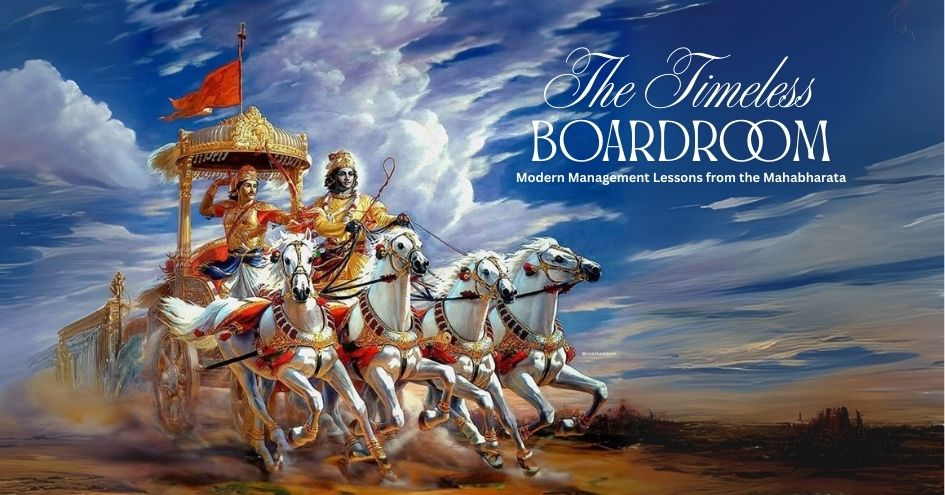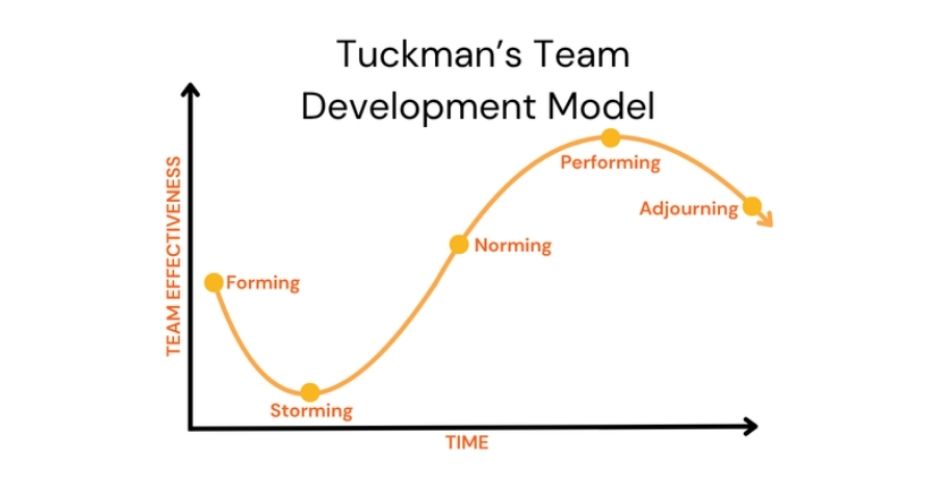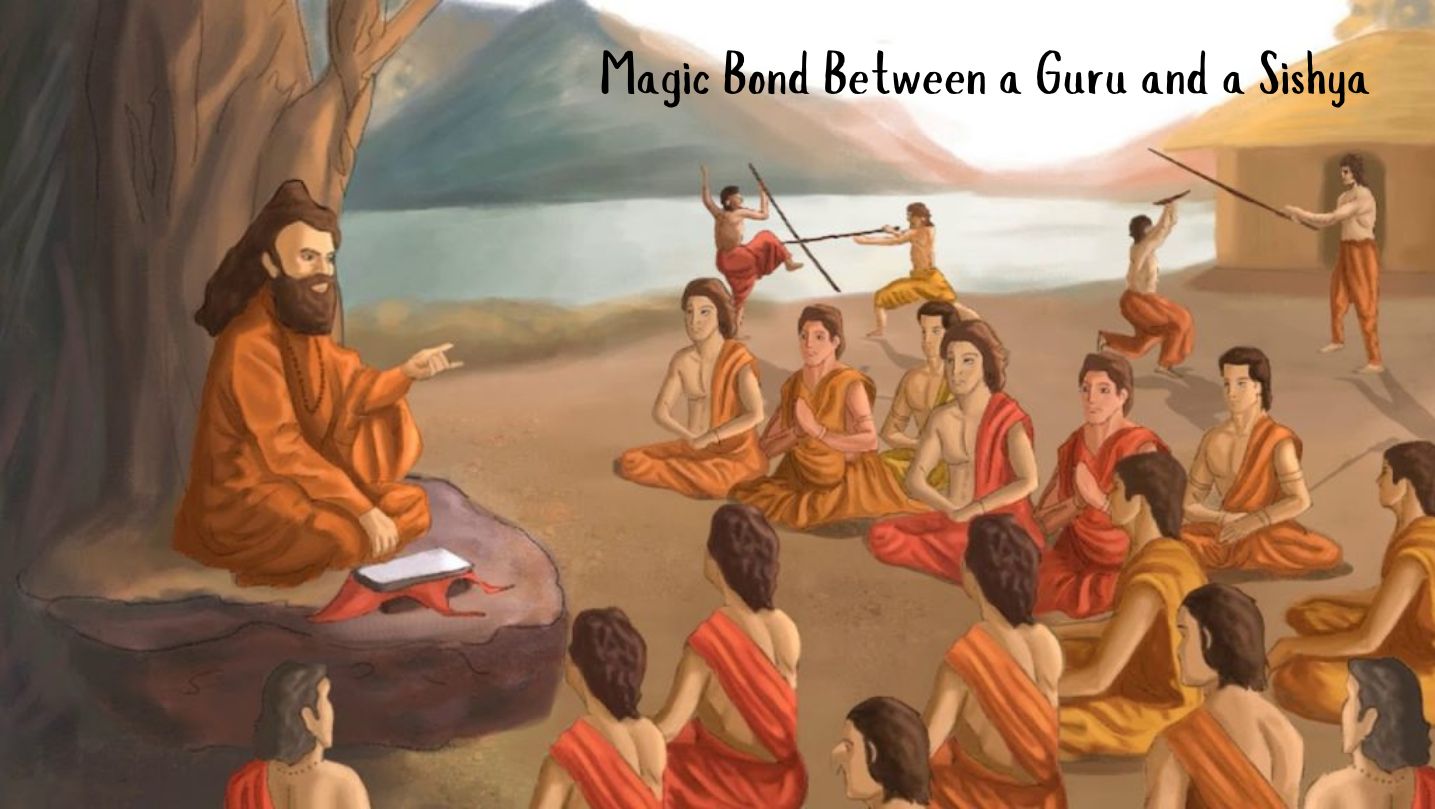
The ancient Sanskrit epic, the Mahabharata, is more than a story of a great war; it's a dense, layered manual of management, revealing the complexities of power, team dynamics, and the lonely burden of making the final call. Though thousands of years old, its insights are as relevant as your next quarterly earnings call.
The Leader's Dilemma: Dharma, Strategy, and Purpose
At the heart of the epic is the concept of Dharma, which can be understood in management terms as an organization's mission, vision, and values rolled into one guiding principle. The struggle with Dharma is embodied by Yudhishthira, the eldest Pandava brother, also known as Dharmaraja, the King of Righteousness. His impeccable brand was built on idealism, but this also became his greatest vulnerability. Goaded into a rigged game of dice, he felt bound by a king's honor to accept the challenge. The result was catastrophic: he gambled away his kingdom, his brothers, himself, and finally, his wife, Draupadi.
The lesson here is the danger of rigid adherence to a single principle at the expense of all others. Yudhishthira’s commitment to the process led to a disastrous outcome. A leader who insists on following a policy "no matter what," even when it causes harm, is channeling this tragic flaw. Modern leadership requires flexible ethics—knowing when a principle serves the greater good and when it becomes a dogma that threatens survival.
Contrast this with the master strategist, Krishna. He operates as a divine consultant, demonstrating non-positional leadership. His power stems from wisdom and trust, not a formal title. Krishna understands that Dharma is contextual; the ultimate goal is the restoration of justice, and he's willing to bend lesser rules to achieve it. His guidance to the Pandavas to use deception to defeat Drona or to neutralize Bhishma was strategically necessary acts to defeat a greater evil. Krishna teaches us that true impact isn't about the title on your business card; it's about the clarity of your vision and the trust you inspire.
The Anatomy of a Team: Culture Trumps All
The Mahabharata presents us with two competing sides: Pandavas and the Kauravas. One succeeds against the odds; the other, despite every advantage, implodes. Looking at them in the current scenario as two companies gives us valuable insights into the management of teams.
The Pandavas were a textbook example of a high-performing, cross-functional team with complementary skills.
Guided by Krishna as their Chairman of the Board, they were united by a shared purpose and deep trust. They went through what we call currently the Tuckman's stages of Group Development: Forming, Storming, Norming, and Performing. Their 13 years in exile served as a grueling "storming and norming" phase that forged them into an unbreakable unit, ready for the "performing" stage of the Kurukshetra War.

The Kauravas, on the other hand, had a larger army and the established kingdom, yet they failed because of a toxic culture. Their culture was built on envy and insecurity, led by the narcissistic heir apparent, Duryodhana, who rewarded sycophants and undermined true talent. Senior executives like Bhishma and Drona were trapped by misplaced loyalty, becoming complicit through their silence. The brilliant performer Karna, crippled by a need for validation from the wrong leader, tied his loyalty to the man who recognized him, not to a worthy mission.
The Kaurava camp lacked psychological safety; no one could challenge Duryodhana, and bad news was punished. The lesson is crystal clear: a team of A-players with a toxic culture will lose to a team of B-players with a culture of trust every single time.
The Art of Negotiation and Crisis Management
Before the war, Krishna’s peace mission to the Kaurava court serves as a masterclass in negotiation. He presented a reasonable, de-escalating offer: give the Pandavas just five villages to avoid a catastrophic war. This was an attempt to find a Minimum Viable Agreement. But Duryodhana, consumed by an emotional and strategic failure of negotiation, famously refused to give enough land to fit on the point of a needle. He had no concept of his BATNA (Best Alternative to a Negotiated Agreement), choosing annihilation over compromise. Ego is often the most expensive item on an organization's balance sheet.
The epic also provides a chilling lesson in crisis management during the dice game—a complete organizational breakdown. In the boardroom of Hastinapura, the elders—Bhishma, Drona, and Vidura—sat silent as disastrous decisions were made. This is a textbook example of groupthink and ethical fading, where the moral dimensions of a decision are replaced by a narrow focus on rules or loyalty. It is how corporate scandals happen, when good people watch bad things unfold because the pressure to conform overrides their conscience.
Into this moral vacuum stepped Draupadi, who, upon being wagered and lost, shattered the silence by questioning the very legitimacy of the authority oppressing her. She reminds us that the person who dares to ask the fundamental, uncomfortable question during a crisis is the true safeguard of an organization’s soul.
The Endgame: Legacy and the Long View
The Mahabharata doesn't end with a simple victory. The Pandavas win, but the victory is mournful, soaked in the blood of their kin. This teaches a crucial lesson: if you destroy your industry, relationships, and morale to "win," you haven't really accomplished anything. It's a call for sustainable, responsible leadership.
The final chapters focus on the long game: succession planning and the wisdom to let go. After ruling for 36 years, the Pandavas crown Abhimanyu's son, Parikshit, ensuring a continuity of leadership before renouncing the world. In his final test at the gates of heaven, Yudhishthira refuses to abandon a loyal dog that has followed him, choosing his companion over paradise. This reveals the ultimate leadership trait: compassion. His Dharma has evolved from a rigid code to a deep, personal empathy.
The Mahabharata doesn’t offer a five-step plan for success. It offers a mirror to see our own ambitions, flaws, and our potential for greatness. Its ancient roots can, and should, help us navigate the complex realities of today.
 Manu Nellutla, also known as Manobhiram Nellutla, is an Indo-Canadian professional with diverse international experience, having lived and worked in four countries across three continents. This has provided him with a rich understanding of various cultures and languages. He is fluent in Telugu, Hindi, English, and Gujarati, and can converse in Kannada, Malayalam, and Oriya. Academically, Manu holds postgraduate degrees in Physiotherapy, Education, Ergonomics, and Business Administration. His professional journey includes roles as a Senior Lecturer, Assistant Professor, Director, Chief Operating Officer, and Chief Executive Officer. An award-winning senior executive, Manu's interests extend beyond his professional life; he is also an author (Janyabharata series) singer, podcast host (Roots and Realities), and an acclaimed public speaker, including appearances on the TEDx platform.
Manu Nellutla, also known as Manobhiram Nellutla, is an Indo-Canadian professional with diverse international experience, having lived and worked in four countries across three continents. This has provided him with a rich understanding of various cultures and languages. He is fluent in Telugu, Hindi, English, and Gujarati, and can converse in Kannada, Malayalam, and Oriya. Academically, Manu holds postgraduate degrees in Physiotherapy, Education, Ergonomics, and Business Administration. His professional journey includes roles as a Senior Lecturer, Assistant Professor, Director, Chief Operating Officer, and Chief Executive Officer. An award-winning senior executive, Manu's interests extend beyond his professional life; he is also an author (Janyabharata series) singer, podcast host (Roots and Realities), and an acclaimed public speaker, including appearances on the TEDx platform.

At the southernmost tip of this mesmerising ensemble lies the majestic Great Nicobar Island, boasting an impressive landmass of about 910 square kilom...

Bharath has always been a land traversed by spiritual masters/ Guru since time immemorial. These spiritual masters have always upheld the core princip...

South India contains its fair share of unique pilgrimage centres. These divine places of worship have a prominent Sthala Purana, devoted followers, di...